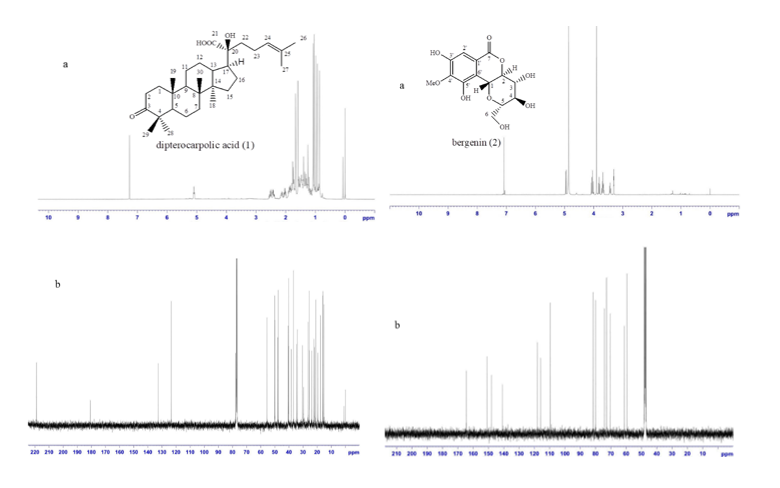Phytochemical Screening and Study of Cholesterol Esterase Inhibitory Activity of Extracts from Stem of Dipterocarpus intricatus Dyer
Keywords:
Dipterocarpus intricatus Dyer, cholesterol esterase, phytochemical screening, spectroscopic methodsAbstract
Dipterocarpus intricatus Dyer is a medicinal plant used for relieving muscle soreness (bark) and curing wounds (resin). This study investigates chemical composition and cholesterol esterase inhibitory activity of D.intricatus stem harvested from Phrasaeng District, Surat Thani Province, Thailand. Using chromatographic method and spectroscopic analysis, two known compounds, dipterocarpolic acid (1) and bergenin (2), were isolated and identified as a triterpene and a coumarin, respectively. Cholesterol esterase inhibition activity of dipterocarpolic acid (1) and bergenin (2) at concentration of 1.0 mg/mL was 35.22±1.44%, and 42.01±1.65%, respectively, whereas methanolic extract showed activity of 31.70±1.23% at 5.0 mg/mL, compared to orlistat (99.55±0.53%). Therefore, D. intricatus extracts are another alternative for further studies in herbal medicine and natural product development.
References
Adebayo, E.A. and Ishola, O.R. 2009. Phytochemical and antimicrobial screening of crude extracts from the root, stem, bark, and leaves of Terminalia glaucescens. African Journal of Pharmacy and Pharmacology 3(5): 217-221.
Al-Shaer, M.H., Choueiri, N.E. and Suleiman, E.S. 2004. The pivotal role of cholesterol absorption inhibitors in the management of dyslipidemia. Lipids Health Dis 3: 1-6.
Ashton, P. 2014. Dipterocarpus baudii. The IUCN red list of threatened species. Available Source: www.iucnredlist. Org, January 7, 2023.
Aslam, M.S., Ahmad, M.S. and Mamat, A.S. 2015. A phytochemical, ethnomedicinal and pharmacological review of genus Dipterocarpus. International Journal of Pharmacy and Pharmaceutical Sciences 7(4): 27-38.
Bhatt, S. and Dhyani, S. 2012. Preliminary phytochemical screening of Ailanthus excelsa Roxb. International Journal of Current Pharmaceutical Research 4(1): 87-89.
Chiou, S.Y., Lai, G.W., Lin, L.Y. and Lin, G. 2006. Kinetics and mechanisms of cholesterol esterase inhibition by cardiovascular drugs in vitro. Indian Journal of Biochemistry and Biophysics 43: 52-55.
Cho, W.C.S., Chung, W.S., Lee, S.K.W., Leung, A.W.N., Cheng, C.H.K. and Yue, K.K.M. 2006. Ginsenoside Re of Panax ginseng possesses signifcant antioxidant and antihyperlipidemic efcacies in streptozotocin-induced diabetic rats. European Journal of Pharmacology 550: 173-179.
Endo, A. 2008. A gift from nature: the birth of the statins. Nature Medicine 14: 1050-1052.
Ghule, B.V., Ghante, M.H., Saoji, A.N. and Yeole, P.G. 2009. Antihyperlipidemic efect of the methanolic extract from Lagenaria siceraria Stand. fruit in hyperlipidemic rats. Journal of Ethnopharmacology 124: 333-337.
Gururaja, G.M., Mundkinajeddu, D., Dethe, S.M., Sangli, G.K., Abhilash, K. and Agarwal, A. 2015. Cholesterol esterase inhibitory activity of bioactives from leaves of Mangifera indica L. Pharmacognosy Research 7: 355-362.
Handa, M., Murata, T., Kobayashi, K., Selenge, E., Miyase, T., Batkhuu, J. and Yoshizaki, F. 2013. Lipase inhibitory and LDL anti-oxidative triterpenes from Abies sibirica. Phytochemistry 86: 168-175.
Jahromi, M.A.F., Chansouria, J.P.N. and Ray, A.B. 1992. Hypolipidaemic Activity in Rats of Bergenin, the Major Constituent of Flueggea microcarpa. Phytotherapy Research 6: 180-183.
Kumar, R., Patel, D.K., Prasad, S.K., Laloo, D., Krishnamurthy, S. and Hemalatha, S. 2012. Type 2 antidiabetic activity of bergenin from the roots of Caesalpinia digyna Rottler. Fitoterapia 83: 395-401.
Le, H.T., Luu, T.N., Nguyen, H.M.T., Nguyen, D.H., Le, P.T.Q., Trịnh, N.N., Le, V.S., Nguyen, H.D. and Van, H.T. 2021. Antibacterial, antioxidant and cytotoxic activities of different fractions of acetone extract from flowers of Dipterocarpus intricatus Dyer (Dipterocarpaceae). Plant Science Today 8(2): 273-277.
Mouafi, F.E., Abdel-Aziz, S.M., Bashir, A.A. and Fyiad, A.A. 2014. Phytochemical analysis and antimicrobial activity of mangrove leaves (Avicenna marina and Rhizophora stylosa) against some pathogens. Journal World Applied Sciences 29(4): 547-554.
Ngamukote, S., Makynen, K., Thilawech, T. and Adisakwattana, S. 2011. Cholesterol-lowering activity of the major polyphenols in grape seed. Molecules 16: 5054-5061.
Pauline, D.Y.P. 2000. Plants used in Cambodia. Self-published. Imprimerie Olympic, Phnom Penh.
Sergent, T., Vanderstraeten, J., Winand, J., Beguin, P. and Schneider, Y.J. 2012. Phenolic compounds and plant extracts as potential natural anti-obesity substances. Food Chemistry 135: 68-73.
Singh, R., Singh, S.K. and Aroma, S. 2007. Evaluation of antioxidant potential of ethyl acetate extract/fractions of Acacia auriculiformis A. Cunn. Food Chemical Toxicology 45(7): 1216-1223.
Smirnovaa, I.E., Do Thi Thub, H., Kazakovaa, O.B., Tolstikova, G.A., Kukovinetsa, O.S., Lobova, A.N. and Suponitskiic, K.Y. 2012. Ozonolysis of dipterocarpol and its derivatives. Russian Journal of Organic Chemistry 10(48): 1370-1376.
Tukiran. 2013. Phytochemical analysis of some plants in Indonesia. Journal of Biology Agriculture and Healthcare 3(4): 6-10.
Vasanthi, P., Ganapathy, M., Evanjelene, V.K., Ayyavuv, N. and Angamuthu, J. 2014. Phytochemical screening and antioxidant activity of extracts of the leaf and bark of Albizzia lebbeck (Benth). Academic Journal of Medicinal plants 2(2): 26-31.
Vittaya, L. and Chalad, C. 2016. Effect of solvent on phytochemical analysis and antibacterial activity of leaf and bark extracts from Rhizophora apiculata. Rajamangala University of Technology Srivijaya Research Journal 8(1): 31-38.
Wang, D., Zhu, H.T., Zhang, Y.J. and Yang, C.R. 2005. A carbon-carbon-coupled dimeric bergenin derivative biotransformed by Pleurotus ostreatus. Bioorganic & Medicinal Chemistry Letters 15(18): 4073-4075.
Wei, Y., Peng, A.Y., Wang, B., Ma, L., Peng, G., Du, Y. and Tang, J. 2014. Synthesis and biological evaluation of phosphorylated flavonoids as potent and selective inhibitors of cholesterol esterase. European Journal of Medicinal Chemistry 74: 751-758.
Wibowo, A., Ahmat, N., Hamzah, A.S., Ismail, N.H., Ahmad, R. and Jaafar, F.M. 2012. Resveratrol oligomers from the stem bark of Dryobalanops aromatica. Biochemical Systematics and Ecology 40: 62-64.
Zhang, L., Tong, Y., Fang, Y., Pei, J., Wang, Q. and Li, G. 2023. Exploring the hypolipidemic effects of bergenin from Saxifraga melanocentra Franch: mechanistic insights and potential for hyperlipidemia treatment. Lipids in Health and Disease 22: 1-16.

Downloads
Published
How to Cite
Issue
Section
License
Copyright (c) 2024 Recent Science and Technology

This work is licensed under a Creative Commons Attribution-NonCommercial-NoDerivatives 4.0 International License.
The content and information in the article published in Journal of Rajamangala University of Technology Srivijaya It is the opinion and responsibility of the author of the article. The editorial journals do not need to agree. Or share any responsibility.






